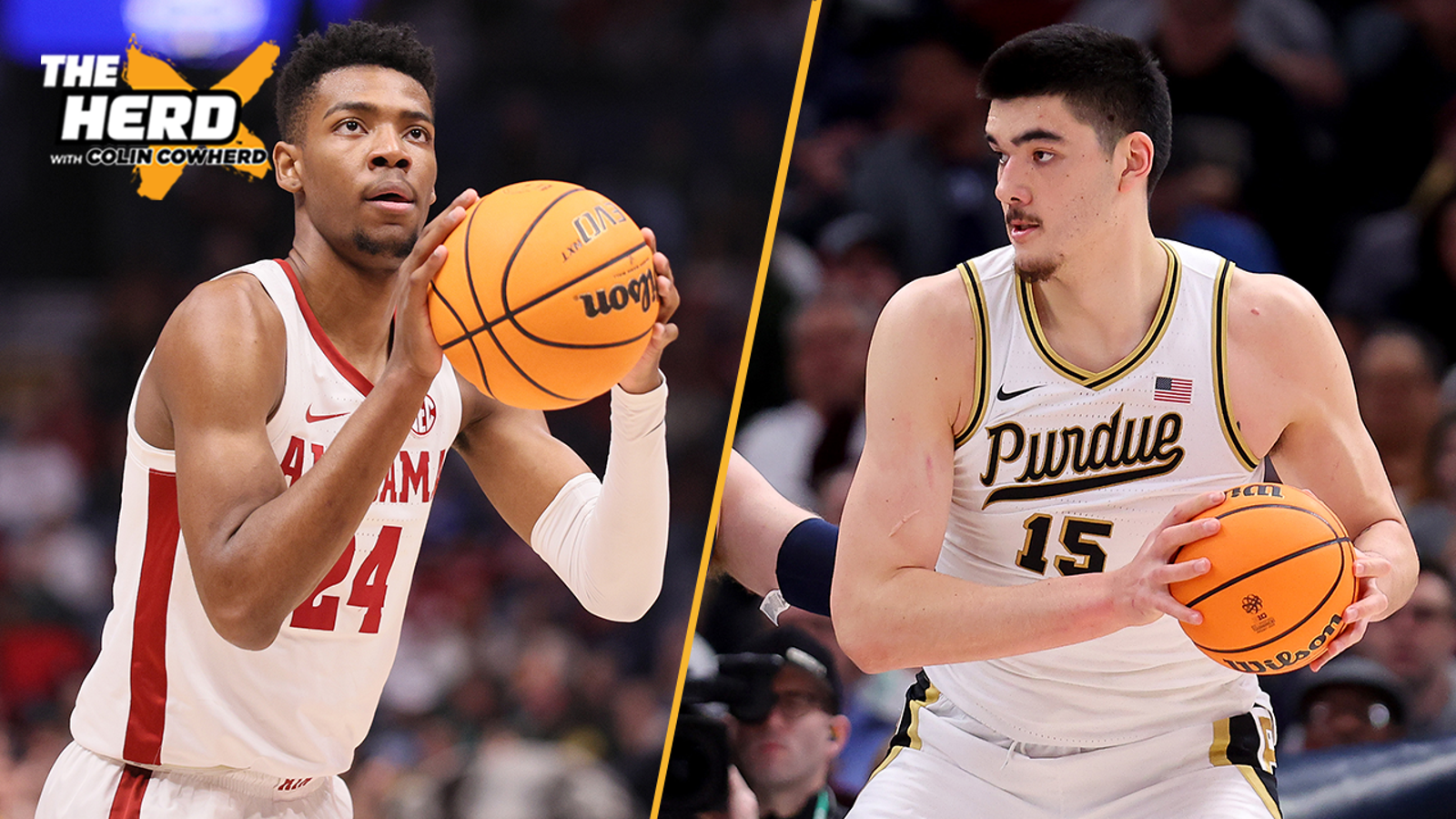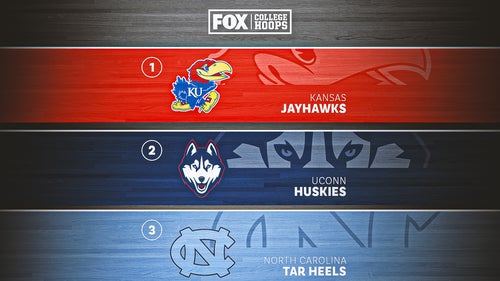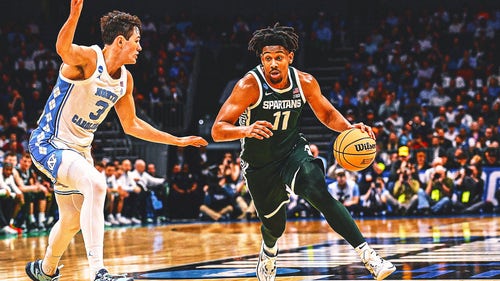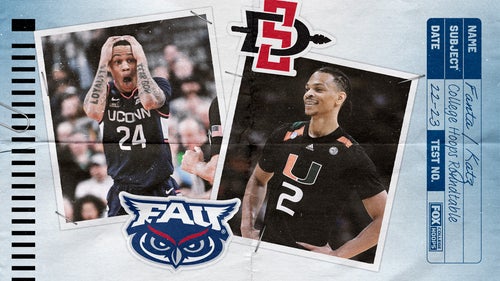
Chris 'The Bear' Fallica's March Madness trends, storylines, historical breakdown
"Bear Bets" are real wagers that Chris "The Bear" Fallica is actually making.
We offered a first impression Monday of what we saw with the NCAA Men's Basketball Tournament bracket release and how those matchups might shake out. I also shared my favorite first-round bets for the tourney, which hopefully helps you win some money.
Now we’re digging into our historical archive for tournament history fans like me. How do certain seeds and teams fare? What are some cool trends and storylines you should know before filling out your bracket?
If you’re into that kind of stuff, we’ve got you covered! So here are some bracket-busting notes for your enjoyment.
Champion, seed and spread-related notes
Each of the past five and 12 of the past 15 national champions were one-seeds. Since the fluky No. 7 vs. No. 8 UConn-Kentucky final in 2014, there has been a one-seed in the final every year, and only one team seeded lower than third reached the NCAA Final (North Carolina last year).
Since Florida's repeat 16 years ago, no defending champion has advanced past the Sweet 16. In each of the past five tournaments, they have been eliminated by the second round (No. 1 seed Baylor in 2022 second round, No. 4 seed Virginia in 2021 first round and No. 6 seed Villanova in 2019, No. 2 seed North Carolina in 2018 and No. 1 seed Villanova in 2017 each lost in the second round).
Want to win your bracket pool? Avoid picking more than two No. 1 seeds in the Final Four. I know you think it’s hard for these No. 1 seeds to lose, but it happens annually. Since seeding began in 1979, only in 2008 have all four No. 1 seeds reached the Final Four. Last year only one reached the Final Four, eventual national champion Kansas.
RELATED: NCAA men's bracket
Since all four No. 1 seeds made the Final Four in 2008, a total of 18 1-seeds have reached the Final Four in the past 13 years.

Since 2010, only 16 No. 1 seeds have reached the Final Four. In that span, 10 No. 1 seeds have lost prior to the Sweet 16.



One thing is for sure in the NCAA Tournament — there will be a Cinderella.
In 10 of the past 11 years (2019 was the outlier), there has been at least one team seeded seventh or lower in the Elite Eight. Last year there were three — Miami, North Carolina and Saint Peter’s — with the eighth-seeded Tar Heels moving on to the Final Four.

Each of the past four years, there have been multiple teams seeded seventh or lower in the Elite Eight. Who will get hot and make a magical run this year?

A look at the seeds to reach the Final Four since 2010 shows that being a No. 4 seed or lower has not been a deterrent in reaching the Final Four. In fact, since 2010, as many teams seeded 10th or lower have reached the Final Four as have No. 3 seeds (four times each).

Of the 94 first-round dogs the past two seasons, 31 won outright. Think that’s impressive? Think again!
Limit the sample to the 70 games not involving a 1- or 2-seed, and 29 were won by the underdog (41.4%). This is despite last year not being as upset crazy as 2019 and 2021. Clearly, don’t be afraid to back an underdog on the moneyline and against the spread (ATS) in the tourney.
Don’t assume the 1- and 2-seeds will roll in the first round. It’s not as easy as it looks. Over the past three tournaments, the top two seeds are just 10-14 ATS. That means if you bet to win $100 on every No. 1 and No. 2 seed to cover, you’re down $540 in that span. Not ideal.
Each of the past two years, we’ve had a No. 15 seed pull a first-round upset. In fact, both Oral Roberts in 2021 and Saint Peter’s last year won multiple games. There has never been a stretch where there have been three straight tournaments with a 15-seed winning, but the oddsmakers seem to think a few of these 2 vs. 15 games are far from a sure thing. For the first time, three 2 vs. 15 games have a spread of 14 points or fewer.
In fact, in the past six years, there have been three 2 vs. 15 games with a spread of 14 or fewer.
2 vs. 15 first-round games – point spreads
UCLA (-17.5) vs. UNC Asheville
In the past five years, just one 3-seed lost in the first round — Texas in 2021 to Abilene Christian. Comparably from 2014-16, four 3-seeds lost. However, in a strange coincidence, the past four 3-seeds to lose in the first round all came from the Big 12: Texas to Abilene Christian in 2021, West Virginia to Stephen F. Austin in 2016, Baylor to Georgia State in 2015 and Iowa State to UAB in 2015.
Also, remember in 2018, Texas Tech was in danger of joining that group before coming back to beat Stephen F. Austin with a 13-2 run in the final four minutes to win 70-60.
We would like to thank the committee for playing along with this theme and making two Big 12 teams a 3-seed this year — Baylor, who is a 10.5-point favorite over UC Santa Barbara, and Kansas State, who is an 8.5-point favorite over Montana State. Also of interest, Kansas State has lost in the first round each of the past two times they were a top-4 seed (2019 to No. 13 UC Irvine, 2013 to No. 13 La Salle).
On a positive note, the Big 12 is trying to become the first conference in 30 years to win three consecutive national titles. The ACC was the last to accomplish it, with Duke (1991-92) and North Carolina (1993) winning it all.
First-round struggles haven’t been limited to 1- and 2-seeds recently. No. 4 seeds have also struggled, going 4-12 ATS and just 11-5 straight up (SU) since 2018.
Last year all No. 4 seeds won, but three of the wins came by one, four and four points. It makes sense when you think about it. Four seeds are teams likely ranked in the mid-to-bottom of the Top 25, and they are facing a conference champion from a good mid-major. Those types of teams lose all the time during the regular season, so it shouldn’t be a surprise now.
This year’s 13-seeds are Furman (+5.5/+185 moneyline) vs. Virginia, Louisiana (+11/+425) vs. Tennessee, Kent State (+4/+145) vs. Indiana and Iona (+9.5/+320) vs. UConn.
At least one No. 11 seed has reached the Sweet 16 in seven of the past eight tournaments, with a pair of 11s reaching the Sweet 16 in three of the past four tournaments, including each of the past two. Loyola Chicago and UCLA reached the Final Four in 2018 and 2021, respectively, as 11 seeds.
File this one away, as I like both Creighton and TCU to reach the Sweet 16. In the past five years, the only 6-seed to reach the Sweet 16 was USC in 2021.
Conference-related notes
The Big Ten has put some great teams in the tournament in recent years, but the last time the Big Ten won a national championship was when Mateen Cleaves, Mo Peterson and Michigan State won it all in 2000. In the past five tournaments, seven Big Ten teams received a 1- or 2-seed, but only Michigan State in 2019 reached the Final Four, while three teams didn’t even make it out of the first weekend (2021 Ohio State, 2021 Illinois and 2021 Iowa).
It's been 26 years since a Pac-12 team won it all when Arizona cut down the nets in 1997. Both Arizona and UCLA are 2-seeds this year. Since UCLA made the Final Four in 2008, five Pac-12 teams received a top-two seed. All five reached the Sweet 16, with three reaching the Elite Eight, only to fall one step shy of the Final Four.
Each of the past seven Southeastern Conference teams to reach the Elite Eight were not No. 1 seeds. In fact, Alabama is the first SEC team to receive a No. 1 seed since Kentucky in 2015.
But being a high seed hasn’t treated Alabama well. In the three instances, the Tide were a 2-seed – this is the first time Alabama is a No. 1 seed – it advanced no further than the Sweet 16, losing to teams seeded sixth, 10th and 11th.
Falling short of the Final Four as a high seed has been a common theme lately in the SEC. Since that Kentucky team in 2015, none of the 15 SEC teams to earn a top-four seed has reached the Final Four. That would also apply to Tennessee in addition to Alabama this year.
In the past four tournaments, there have been five teams from the ACC which reached the first round as an at-large and were a double-digit seed. Four of the five won their first-round game, with Virginia Tech’s OT loss to Florida the only loss in that span. No. 11 NC State will look to continue this run of ACC double-digit at-large success.
Dating back to Nevada’s win in 2018, Mountain West teams have lost seven straight first-round games, with only one decided by fewer than nine points (five were by 11 or more points). MWC teams are 1-10 in their past 11 first-round games.
Alabama, Houston, Kansas, and Purdue selected as 1-seeds for NCAA Tournament
Important Team notes
Auburn finds itself right in its comfort zone. Not only because it will be playing its first-round game in Birmingham but because the ninth-seeded Tigers are 10-0 in first-round games, with six of those 10 wins coming as a No. 7 seed or lower.
UConn is a popular Final Four pick, but since winning the 2014 national championship as a No. 7 seed, the Huskies have just one tourney win. However, this is their best seed since 2011, when they won the national title as a No. 3 seed. UConn has lost in the first round each of the past two seasons under Dan Hurley (2021 as a No. 7 seed to Maryland and last year as a No. 12 seed to New Mexico State).
The last two Missouri Valley Conference teams not named Loyola to reach the NCAA tournament lost their first-round games by 16 and 11 points, including 11th-seeded Drake to USC in 2021 (72-56).
The last two times the Blue Devils failed to receive a top-four seed, they lost in the first round. In 2007, sixth-seeded Duke lost to VCU and in 1996, the eighth-seeded Blue Devils lost to Eastern Michigan.
The Bulldogs have won 13 straight first-round games by an average of 17.2 points per game. Each of Gonzaga’s past four first-round games as a top-three seed have been decided by 20 or more points.
Since the field expanded, the Wildcats have never lost in the first round in consecutive years. This is the shortest line for a first-round game at Kentucky for John Calipari. The previous low was five vs. Davidson in 2018, a game UK won 78-73.
Marquette was unranked in the preseason, went on to win the Big East and earn a No. 2 seed. Some will say the Golden Eagles overachieved a lot already. However, there’s some unfinished business for coach Shaka Smart. He has lost six straight first-round games (five by four points or fewer, including three in OT), including as a No. 3 seed to Abilene Christian in 2021.
Is it time to tap the brakes a bit on "January, February, Izzo …"? Michigan State has failed to make it past the first weekend in five of the past six tournaments.

If it feels like Missouri has been here before, well, it has. The Tigers have lost five straight first-round games. Four of the five games saw a spread within three points either way. The other, of course, was the loss to 15-seed Norfolk State as a 21.5-point favorite, which remains the largest point-spread upset since the field expanded. Missouri is a 1.5-point dog to Utah State.
Matt Painter has coached 30 NCAA tournament games at Purdue. Seventeen have been decided by single digits, 12 by five points or fewer and six in overtime.
Under Painter, Purdue is 1-8 vs. top-three seeds, 6-0 vs. teams seeded fourth through seventh (including wins by two, three, four and three points) and 4-3 vs. teams seeded eighth through 12th. Last year the Boilermakers were eliminated in the Sweet 16 by No. 15-seed Saint Peter’s.
Under Painter, Purdue has been a top-three or four seed three times. The Boilermakers won and covered their first-round game all four times, winning by 13, 26, 22 and 22 points.
Rick Barnes' teams are 2-12-1 ATS in his past 15 NCAA tournament games. Since Texas made the Elite 8 in 2008, Barnes’ teams have made it past the first weekend once in 10 trips and haven’t beaten a single team with a higher seed (0-7). That stretch includes being knocked out in the second round as a 3-seed in 2018 when the Vols lost to 11-seed and eventual Final Four participant Loyola Chicago, by 12-seed Oregon State in the 2021 first round and last year when the third-seeded Vols were knocked out by 11-seed Michigan. But Barnes’ teams just don’t have a knack for being upset, they also rarely pull an upset as they are 1-11 vs. higher-seeded teams. The Vols first potential chance to beat a higher seed this year would be in the Sweet 16 vs. Purdue.
Texas last reached Sweet 16 in 2008. Eleven of the Longhorns' past 13 NCAA tourney games have been decided by eight points or fewer, with eight decided by five points or fewer. Since the Longhorns last reached the Sweet 16 in 2008, 71 different teams have reached the Sweet 16, including Florida Gulf Coast, LaSalle, Northern Iowa, Cornell, Loyola Chicago, Ohio, Richmond, Saint Peter’s and Oral Roberts.
Under Tony Bennett, Virginia has played 13 tournament games vs. a 15- or 16-seed that didn’t go to OT. The Cavaliers were held to 63 points or fewer in nine of them and, of course, that doesn’t include the shocking 74-54 loss to UMBC in 2018. UVA erased that memory by winning the 2019 national title, but it has been very prone to upsets. Virginia has been eliminated by a team seeded at least nine spots lower than them in three of the past four instances UVA lost a tournament game. The Cavaliers also are 3-8 ATS in their last 11 NCAA tournament games.

Sean Miller lost the last NCAA tournament game he coached, an 89-68 loss, with Arizona to 13-seed Buffalo as a 9.5-point favorite in 2018. Miller’s third-seeded Musketeers are an 11.5-point favorite over Kennesaw State.
Chris "The Bear" Fallica has covered sports for nearly three decades. While college football has been his focus, he also enjoys the NFL, Soccer, Golf, Tennis, MLB, NHL and Horse Racing, with an "occasional" wager on such events. Chris recently won the inaugural Circa Football Invitational and finished in the Top 10 of the Golden Nugget Football Contest. He’s a multiple-time qualifier for the NHC Handicapping Championship. Remember, "The less you bet, the more you lose when you win!" Follow him on Twitter @chrisfallica.
Top March Madness betting stories:
- Chris "The Bear" Fallica's expert region-by-region NCAA Tournament breakdown
- 2023 March Madness bracket picks, sleepers from our experts
- Sammy P's best bets for the first round of March Madness
- Bookmakers discuss betting action on March Madness first round matchups
- 2023 NCAA Tournament 10 early March Madness betting thoughts
- Mattress Mack eyes 35 million sports betting win if Houston wins NCAA Tournament
- Chris "The Bear" Fallica's March Madness first round expert betting picks
- March Madness odds gambling trends to know for NCAA Tournament
- 2023 NCAA Championship every teams odds, favorites to win March Madness
- 2023 Womens NCAA Tournament odds, sleepers, expert picks to win March Madness
- 2023 March Madness odds NCAA Tournament odds for every game
Play FOX Super 6 every week for your chance to win thousands of dollars every week. Just download the Super 6 app and make your picks today!










































































































































